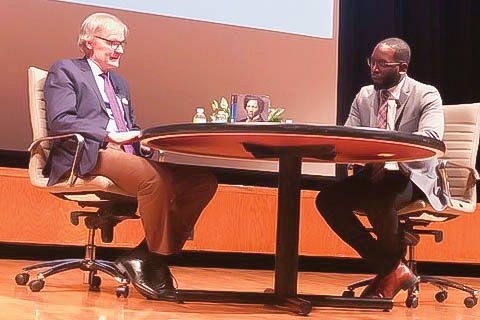
“Douglass was a creature of words,” Blight said. Unperturbed, Blight ensured that Douglass’ voice and “genius” with words remained a primary theme, as Frederick Douglass follows its subject from his birth as an enslaved child in Maryland, through his rise as a fierce advocate of abolition and social reform. So central is Douglass’ own command of language to Blight’s biography that the author describes his book as a “biography of a voice.” (He even considered that as a title, but was quickly vetoed by his editors). “That’s not something you can say about every biography of a major U.S. “For how long it is, it’s also quite cinematic and quite entertaining,” Atkinson said.


Although they received recommendations “on a lot of well-reviewed, mammoth biographies,” Atom Atkinson, director of literary arts, said Blight’s stood out, not only for the potential of a CLSC lecture on the Fourth of July, but also for Blight’s command of language. The lecture is co-sponsored by the African American Heritage House, and holds a particular resonance for a talk on the life and legacy of the great American orator, as Douglass delivered his seminal speech “What to the Slave Is the Fourth of July?” on July 5, 1852, in Rochester, New York, about a two-and-half-hour drive from the Institution grounds.Īt 888 pages, Frederick Douglass is the result of a decade of work and the culmination of Blight’s career as a professor and public historian. today, July 4, in the Hall of Philosophy. “I just remember thinking, ‘Who is this guy?’ ” he said.īlight will give the second Chautauqua Literary and Scientific Circle author presentation of Week Two, a lecture on his biography Frederick Douglass: Prophet of Freedom at 3:30 p.m.

But it wasn’t until he was creating his own courses in black history as a public high school teacher in Flint, Michigan, and later pursuing his graduate degree in the late ’70s and early ’80s, that Blight properly encountered the man whose name and likeness graces the cover of his Pulitzer Prize-winning biography.

Blight does not remember learning about Frederick Douglass in high school.Īs a college student in the late ’60s and early ’70s, the current director of the Gilder Lehrman Center for the Study of Slavery, Resistance, and Abolition at Yale University, recalls some mention of Douglass.


 0 kommentar(er)
0 kommentar(er)
